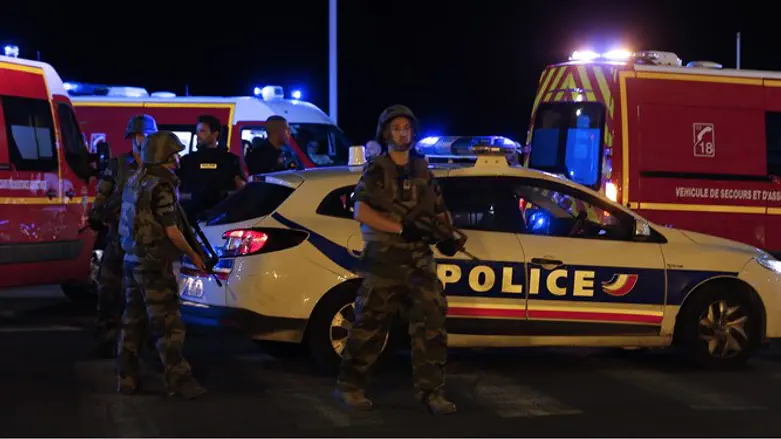
(AFP) France was set to hold a minute's silence on Monday to honour the 84 victims of the Nice truck attack, but a period of national mourning was overshadowed by bickering politicians.
Church bells will toll across the country, and the country will fall silent at midday, a now grimly familiar ritual after the third major terror attack in 18 months on French soil.
French investigators have yet to find links between attacker Mohamed Lahouaiej-Bouhlel, a 31-year-old Tunisian, and the Islamic State group which claimed responsibility for the carnage, Interior Minister Bernard Cazeneuve told France's RTL radio.
"We cannot exclude that an unbalanced and very violent individual" has been "through a rapid radicalisation, committed to this absolutely despicable crime," he said.
Six people were in custody on Monday including a 38-year-old Albanian suspected of providing Lahouaiej-Bouhlel with a pistol he used to fire at police during the attack.
Lahouaiej-Bouhlel was shot dead after zigzagging a 19-tonne truck through a crowd of tourists, locals and families enjoying a fireworks display in the Riviera city of Nice on Bastille Day.
Mangled bodies were left strewn across the Riviera city's seafront in the grisly attack by a man described by those who knew him as a loner with a history of violence and depression.
The attack comes eight months after IS jihadists killed 130 people across Paris, and 18 months after three days of terror at the Charlie Hebdo weekly and a Jewish supermarket killed 17.
Former president and main opposition leader Nicolas Sarkozy said Sunday that "everything that should have been done the past 18 months was not done".
"We are at war, outright war. So I will use strong words: it will be us or them," he said.
'Shameful' politicians
While previous attacks saw grand displays of national unity, any semblance of cohesion quickly unravelled after the Nice massacre and Sarkozy joins a long line of opposition politicians who have criticised the government.
Cazeneuve described the politicians as "shameful".
"Certain members of the political class have not respected the mourning period. Arguments broke out right away which personally saddens and shocks me," he said.
The frustration of the French was writ large in some of the messages left among flowers and tributes on Nice's seafront.
"Enough with the speeches" and "Sick of carnage in our streets", the messages read.
The government has sought to fend off criticism, assuring that security at the Bastille Day event was high and scrambling to reassure citizens about their safety.
Cazeneuve called for volunteers to boost the security forces who were already on high alert under an eight-month-old state of emergency.
"I want to call on all French patriots who wish to do so, to join this operational reserve," said Cazeneuve of a force currently made up of 12,000 volunteers aged between 17 and 30.
The latest attack comes after a French parliamentary inquiry last week criticised numerous failings by the intelligence services following jihadist assaults in January and November last year.
France is a prime target of IS, due to its role in fighting the group in Iraq and Syria, its emphasis on secular values, and what the government has admitted is a "social and ethnic apartheid" that alienates its large Muslim community.
Text messages and selfies
But the deadly use of an easily obtainable vehicle as a weapon by a man who had no history of radicalisation, has highlighted the challenge for intelligence and security officials in stopping such attacks.
"We are now confronted with individuals open to IS's message to engage in extremely violent actions without necessarily having been trained or having the weapons to carry out a mass (casualty) attack," Cazeneuve said earlier.
As investigators piece together details about his motives and planning, it emerged Lahouaiej-Bouhlel had used the rented truck to stake out the Nice seafront for two consecutive days before striking.
A source close to the investigation told AFP that he had also sent a text message just before the attack in which he "expresses satisfaction at having obtained a 7.65-millimetre pistol and discusses the supply of other weapons".
He also took a selfie at the wheel of the truck in the days before the attack.
In Nice, many people were still desperately waiting for news of their loved ones.
Prosecutors said just 52 victims had been officially identified so far as they take painstaking measures to avoid errors of identification seen during the Paris attacks last November.
At least 10 children were among the dead, as well as tourists from Ukraine, Switzerland, Germany, and a local Russian association said there were about 10 victims from Russia.
Health Minister Marisol Touraine said 85 people were still hospitalised, 18 of them in critical condition.